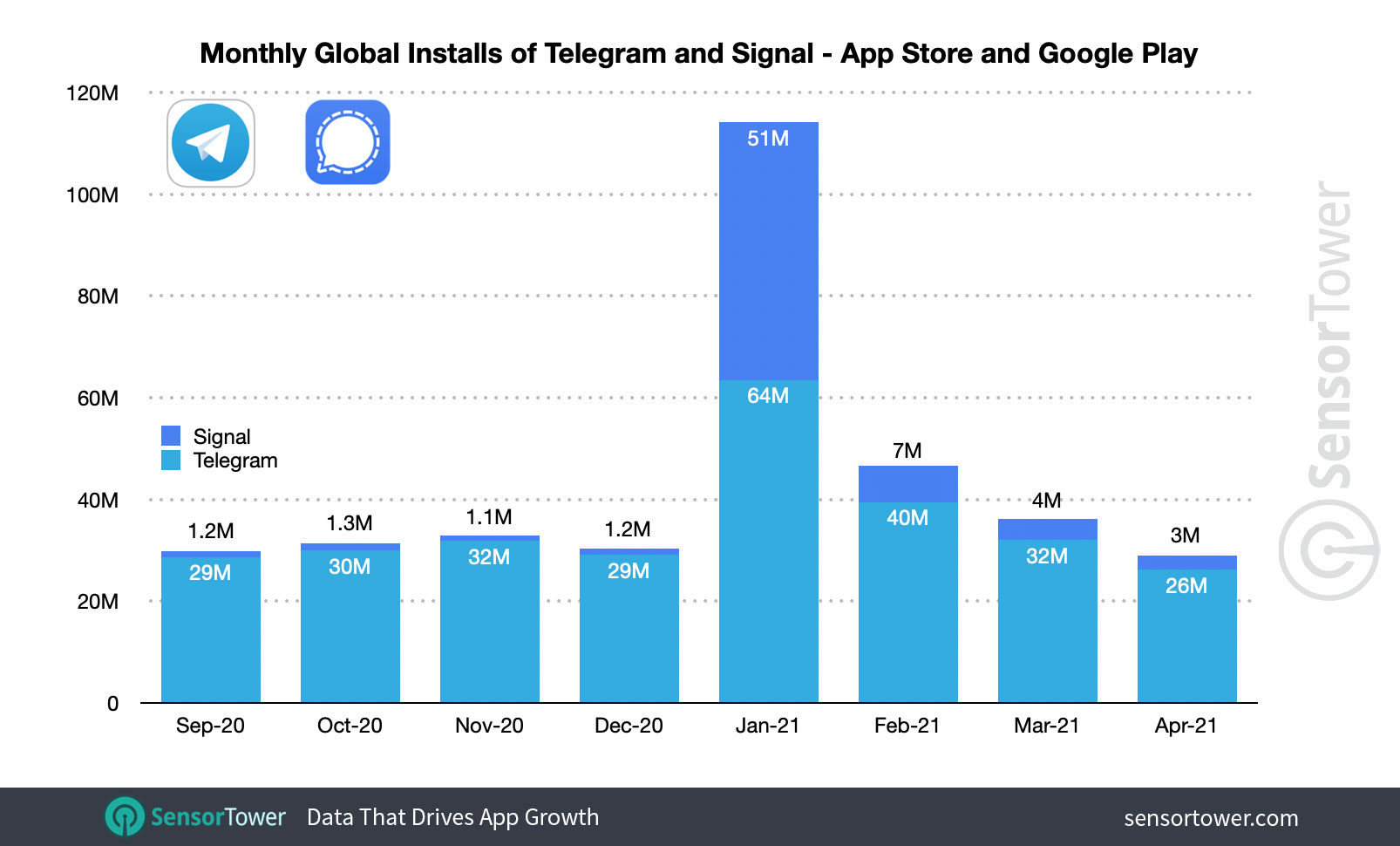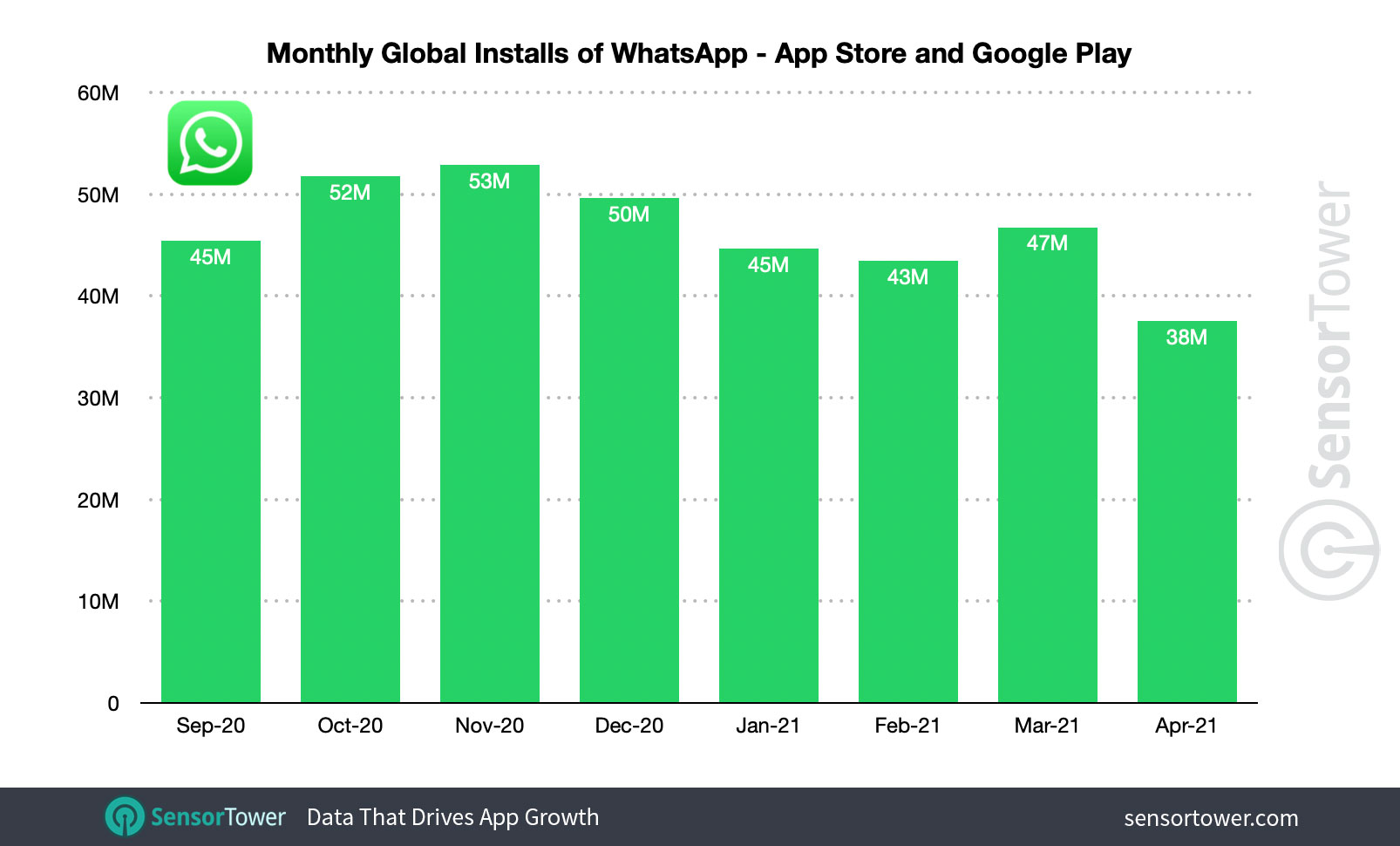2026 State of Mobile is Live!
Mobile App Insights · Stephanie Chan · May 2021
WhatsApp Rivals See Nearly 1,200% Growth Ahead of Privacy Policy Deadline
Sensor Tower data reveals that WhatsApp installs declined year-over-year while competitors Signal and Telegram saw a surge in early 2021.

Popular mobile messenger WhatsApp encountered backlash in January when it was announced that users would need to accept a new privacy policy by May 15, 2021 in order to continue using the app's full feature set in perpetuity—and its competitors have seen an uptick in adoption as a result. Sensor Tower Store Intelligence data reveals that mobile users flocked to alternatives led by Telegram and Signal following the announcement. In the first four months of 2021, Telegram's installs climbed 98 percent year-over-year to more than 161 million, while Signal saw its first-time downloads surge 1,192 percent Y/Y to 64.6 million.
Worldwide installs of WhatsApp's mobile app declined 43 percent Y/Y for the January to April period, although they still outpaced its competitors, reaching approximately 172.3 million.
Telegram and Signal's Installs Are Normalizing
Telegram and Signal both saw a spike in adoption in January, but their download velocity has since slowed. In January, Telegram reached 63.5 million downloads, up 283 percent Y/Y from 16.6 million. Its installs have declined month-over-month since that initial uptick, and its downloads in April saw a slight 3 percent dip Y/Y, hitting 26.2 million as compared to nearly 27 million a year earlier.

It's clear that both apps saw an influx of interest in January due to users seeking messaging alternatives. Although that surge has slowed, Signal in particular is still experiencing elevated adoption. Signal's installs in January grew 5,001 percent Y/Y to 50.6 million, from 992,000 in January 2020. In February, its installs fell 86 percent M/M to a little more than 7 million. Although its installs have declined each month since the January spike, Signal is experiencing consistent Y/Y growth each month. In April, it saw 2.8 million downloads globally, more than double the 1.3 million in April 2020.
WhatsApp Adoption Remains Muted on Mobile
Even before WhatsApp received backlash for its mandatory privacy policy, the mobile app's first-time installs saw a decline around the onset of the COVID-19 pandemic. In April 2020, it saw approximately 55.2 million installs globally, down 28 percent M/M from 76.5 million in March.

The decline in its installs throughout 2020 was possibly due to potential new users—eager to communicate with friends and loved ones—opting for the desktop or web versions of WhatsApp or other apps while sheltering in place.
After the Deadline
The deadline for users to accept WhatsApp's new privacy policy is May 15, although the publisher has said that there will be a grace period where full functionality is still available. Signal and Telegram are only two alternatives, and consumers might continue experimenting with other messaging platforms.
However, the situation is still developing and made all the more complex by shifting user behavior. Parts of the world are beginning to reopen, while others are still besieged by the ongoing pandemic. The topic of virtual workplaces is also still top-of-mind, which will impact the way consumers use mobile messaging and potentially eliminate commutes permanently for a certain portion of the workforce. As the circumstances continue to evolve, we will likely see changes to the way consumers message and the platforms they gravitate to.
